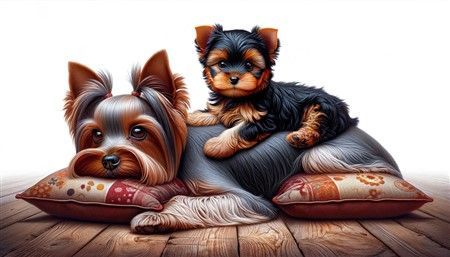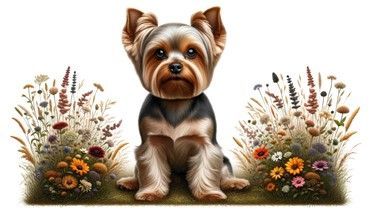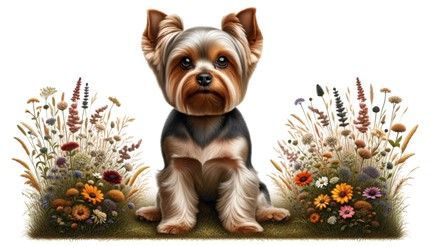Yorkie Behavior & Temperament
This section covers traits seen across all terrier-type dogs, Yorkshire Terrier behavior and temperature per AKC (and other kennel club) breed standards, behavioral traits as reported by pet parents of Yorkies from a poll that we conducted, and behavior of Yorkie puppies vs adults.
For advice regarding specific behavioral issues, see 'Related Behavioral Articles' below.
Overview
Yorkshire Terriers, affectionately known as Yorkies, are celebrated for their vibrant personality and unmistakable charm. Despite their diminutive size, these delightful toy breed dogs exhibit a wide range of temperaments, from bold and adventurous to gentle and reserved. Their behavior often displays a level of confidence and courage that contradicts their small stature, yet it's not uncommon to encounter Yorkies who are a bit shy and more cautious, reflecting the breed's diverse personality spectrum.
Characteristically intelligent and keenly alert, Yorkshire Terriers are quick to learn and adapt, making them excellent companions for a variety of lifestyles. They are also known for their affectionate nature, and form strong bonds with their humans. Many Yorkies love attention and interaction, making them great companions.
Yorkies are typically social but can exhibit reserved or wary behavior around strangers, showcasing a discerning nature that adds to their charm. They generally coexist well with other dogs and cats, but their ingrained 'ratter' instincts may drive them to chase smaller animals such as hamsters and gerbils.
Let's dive in to discover more about what sort of behavior to expect with Yorkies of all ages.
Common Traits Seen with Terrier Breeds
Terriers, in general, possess instincts finely tuned through generations of selective breeding, primarily to hunt and eliminate vermin swiftly. These instincts are evident in the Yorkshire Terrier, developed from various terrier breeds, including the Skye Terrier and the now-extinct Paisley Terrier, to serve similar purposes. Key characteristics of terriers seen with the Yorkshire Terrier, Silky Terrier, Biewer Terrier and others include:
- Fun and Active: Terriers are vivacious and always ready for activity, making them ideal companions for adventurous owners. Despite their small size, they crave ample exercise and exploration.
- Alertness: With a background in vermin control and hunting small game, terriers are naturally vigilant, often the first to notify their owners of anything amiss. This alertness translates into a readiness to act, sometimes leading to reactivity towards other animals, including pets like cats.
- Determination and Courage: Facing down vermin, foxes and other animals requires bravery and tenacity, qualities that terriers possess in abundance. These characteristics enable them to confront challenges larger than themselves with confidence.
- Vocal Tendencies: Many terriers are inclined to vocalize, a trait particularly pronounced in breeds used for underground work where being heard is crucial for safety. Without proper stimulation or in situations of boredom or excitement, terriers can become prone to excessive barking.
- Digging: Some terriers may be enthusiastic diggers, a trait that can be challenging for those who cherish their gardens. Providing a dedicated digging area or sandbox can help manage this instinctual behavior, allowing them to express their natural tendencies in a controlled environment.
Yorkshire Terrier Behavior and Temperament per Breed Standards
The breed standards set by major kennel clubs globally, including the American Kennel Club (AKC), the Kennel Club of the UK (KC), the Canadian Kennel Club (CKC), and the Federation Cynologique Internationale (FCI), offer concise yet valuable insights into the expected temperament and behavior of Yorkshire Terriers.
Breed standards highlight not only the physical attributes but also the demeanor that Yorkshire Terriers should exhibit, reflecting the ideal characteristics sought after in conformation events and for the breed in general. Let's take a quick look at the temperament descriptions provided by these kennel clubs, illustrating the qualities that define Yorkshire Terriers.
American Kennel Club (AKC):
The AKC does not list an expected temperament on the breed standard in its own distinct section; however, under 'General Appearance' there is a hint of the Yorkshire Terrier's ideal behavior in conformation events: "...the dog's high head carriage and confident manner should give the appearance of vigor and self-importance."
The Kennel Club of the UK (KC):
Temperament: Spirited with even disposition.
Yorkshire Terrier Behavior of Puppies vs Adults
Owning a Yorkshire Terrier offers a unique blend of joy, challenges, and endless companionship. Whether you're marveling at the lively antics of a puppy or enjoying the steady affection of an adult, knowing what to expect at each stage can greatly enhance your experience. Let's explore the differences in behavior between Yorkshire Terrier puppies and adults across key categories.
Energy Level:
Puppy: Yorkshire Terrier puppies are bundles of energy, often engaging in short bursts of play interspersed with naps. Their curiosity drives them to explore everything around them, requiring constant supervision. To manage their high energy, regular playtimes and a variety of toys are essential.
Adult: As they mature, Yorkies generally become less hyperactive and you'll start to see changes around the 1 year mark. Energy levels even out, leading to a more predictable daily routine that is clear to see by the age of 3 years old. While still playful and enthusiastic about walks, adult Yorkies are more content to spend time cuddling with their owners.
Sociability:
Puppy: Puppies are naturally more open to new experiences, including meeting new people and other animals. This openness makes the puppy stage ideal for socialization, a critical process that shapes their future behavior and comfort in various situations.
Adult: Adult Yorkshire Terriers may become more discerning with their affections, often forming strong bonds with their family while being cautious around strangers. Their loyalty makes them excellent companions, but it also means they might bark at unfamiliar faces or sounds.
Trainability:
Puppy: Pups are smart and eager to please, making them highly trainable. The first year is crucial for establishing basic commands, potty training, and good manners. Positive reinforcement techniques work best, rewarding desired behaviors with treats and praise.
Adult: Training an adult Yorkshire Terrier can require more patience, especially if they've picked up any stubborn habits. However, their intelligence and desire to please remain, meaning they can still learn new tricks and behaviors with consistent, positive training methods.
Adaptability:
Puppy: Yorkshire Terrier puppies often adapt quickly to new environments and situations, thanks to their innate curiosity and lack of established routines. This trait makes it an ideal time to introduce them to various experiences, from car rides to new types of people and pets.
Adult: Adult Yorkies may exhibit more resistance to change, preferring the comfort and predictability of their routine. If you are opening your home to an adult that may be lacking some socialization, gradual introductions to new experiences and environments can help them adjust without undue stress.
The Results of a Yorkie Behavior and Personality Poll
We here at YorkieInfoCenter previous conducted an online poll asking site members all sorts of questions about their Yorkies, including personality-related queries. There were 2,146 respondents; of these, 72% were in the US, 8% were in the UK, 8% were in Canada, and the remaining number were from various other countries.
The ages of the Yorkies were 3% young puppy (under 6-months-old), 10% puppy (6 to 12-months old), 51% young adult (1 to 3-years-old), 26% adult (4 to 8-years-old), 10% senior (9+ years). In regard to gender of the Yorkies, there were 56% males to 44% females.
One question asked, "What was the biggest challenge(s) you’ve had with your Yorkie?"
We let owners know that health issues were not included in this (it was covered separately), they could choose as many issues that applied and there was an ‘Other’ option and a comment box. The responses were as follows:
- Housebreaking 22%
- Separation anxiety 18%
- Barking 16%
- Eating issues 7%
- Refusing to listen to me 7%
- Getting along with other dogs outside the house 6%
- No challenges that I can think of! 5%
- Getting along with visitors 4%
- Other 4%
- Aggression (nipping, growling, etc.) 4%
- Getting along with other pets 4%
- Disliking the car 4%
- Nipping at me or others 3%
- Destructive chewing 3%
- Refusing to go for walks/exercise 2%
We also asked respondents to summarize their Yorkie’s personality in 3 words. These are the top 30 adjectives entered (in alphabetical order):
- Adorable
- Affectionate
- Bossy
- Cheeky
- Clingy
- Curious
- Cute
- Demanding
- Energetic
- Fearless
- Friendly
- Funny
- Happy
- Hyper
- Independent
- Inquisitive
- Intelligent
- Jealous
- Loving
- Mischievous
- Playful
- Precious
- Protective
- Quirky
- Sassy
- Smart
- Spoiled
- Spunky
- Stubborn
- Sweet
Acting Strange. A great summary that covers what sort of behaviors are normal and which are not (possible red flags of an issue). This is a great way to help understand your Yorkie. Yorkshire Terrier Acting Strange.
Aggression. The Yorkshire Terrier is not known as an aggressive dog; most have an energetic yet very friendly personality. There are exceptions, or course. See why a Yorkie may growl or display other aggressive behaviors and how to address this: Yorkshire Terrier Aggression.
Barking. Some Yorkies may bark at other dogs, people, animals encountered while out on walks and other elements. While some vocalization is normal, you'll want to implement some training techniques if things are out of control: Yorkshire Terrier Excessive Barking.
Barking at Night. This mainly focuses on new Yorkshire Terrier puppies that bark, whine and cry at night when in their new home. See helpful tips for creating a secure, safe area for a pup and how to deal with nighttime vocalization: Yorkie Puppy Barking at Night.
Biting. Seen mostly with young puppies, and particularly with those that are teething, this refers to nipping and is something that shouldn't be ignored. We also touch a bit on actual biting (a rare behavior with this breed): Yorkshire Terrier Biting Behavior.
Coprophagia (aka Eating Feces). This is a common yet somewhat disturbing behavior among canines. Some dogs eat their own poop and some eat that of other dogs or even cats. There are several theories about why dogs do this; however, no matter the root cause, there are steps you should take asap: Yorkshire Terrier Coprophagia.
Digging. While not all Yorkies love to dig, for some it is a favorite hobby. If your little guy or gal is making holes all over the yard, read why this behavior may be manifesting and how to resolve it. Yorkshire Terrier Digging Behavior.
Eating Grass. This is a common behavior with dogs. Reasons can include a diet lacking in certain nutrients, so it is something that should be addressed: Yorkshire Terrier Eating Grass.
Licking, Self-licking. In many cases, licking or chewing at the paws, tail or other parts of the body is due to itchiness, which itself has several causes. In other instances, this can be a self-soothing behavior to cope with stress. Read more about to address this: Yorkshire Terrier Self-licking Issues.
Licking People. It's nice to get puppy kisses and have your dog show some affection in this way, however in some cases it can get really out of control. Learn why some Yorkies do this and exact training steps to have this resolved quickly. Yorkshire Terrier Excessively Licking People.
Picky Eating. If your Yorkshire Terrier is very fussy and it seems near impossible to find a food that they like or will stick with, this article is for you. See our top tips to get things back on track asap: Yorkshire Terrier Picky Eating.
Refusal to Eat. If your Yorkie puppy or adult dog has a sudden lack of appetite or outright does not want to eat, this is something that should be addressed right away: Yorkshire Terrier Refuses to Eat.
Refusal to Walk on Leash. If every walk is a struggle and you're finding it difficult for your puppy or dog to receive enough exercise, see these training tips to get even a stubborn Yorkie to walk right alongside you: Yorkshire Terrier Refuses to Walk on a Leash.
Scared of Cars and Traffic. It's very normal for small dogs to be fearful of traffic along busy roads. There are some steps you can take to help with this apprehensiveness: Yorkshire Terrier is Afraid of Cars.
Scooting. If your Yorkie rubs their rear end across the ground, particularly on textured surfaces like carpeting or grass, these are the top reasons why dogs do this. Includes steps to take for each cause: Yorkshire Terrier Scooting Behavior.
Separation Anxiety. It is very common for Yorkshire Terriers to have trouble with being home alone. Thankfully, there are some steps you can take to help a Yorkie feel secure and more confident when you're away: Yorkshire Terrier Separation Anxiety.
Shaking, Shivering. This is not uncommon with small toy breeds like the Yorkshire Terrier. It can be due to a number of reasons and there are steps you can take to resolve this: Yorkshire Terrier is Shaking, Trembling.
Shyness. Some Yorkies are very timid and may have trouble around visitors or those encountered when out and about. This is mainly a behavior seen mainly rescued dogs, but not always. Read tips on how to help an overly shy Yorkie feel secure and comfortable: Yorkshire Terrier Shy Behavior.
Do you have your book?
Now available in both a hard copy and an eBook, see what's included with Y.I.C.'s GIANT Book of Yorkshire Terrier Care.
More Articles:
Yorkshire Terrier Do and Don't List - A super-helpful concise guide on the most important do's and the most vital don'ts for this amazing toy breed. How many are you following?









